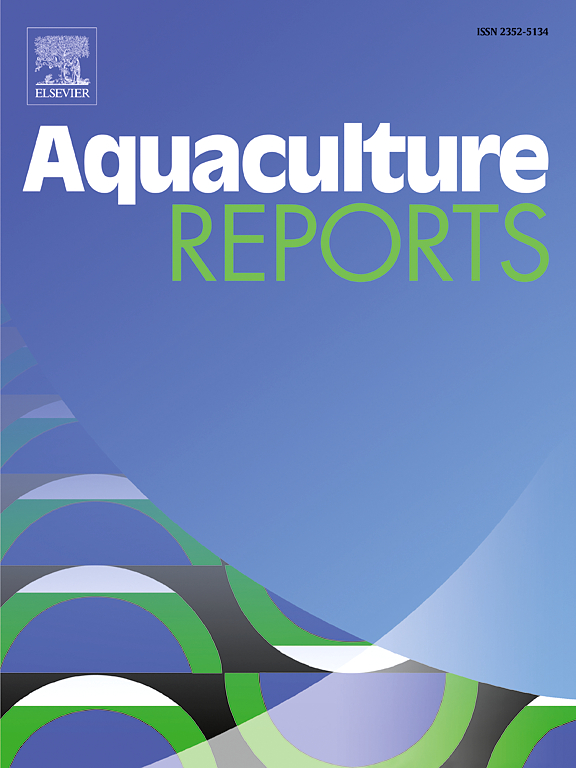Effects of Lactobacillus plantarum supplementation on growth performance, digestive enzyme activity, antioxidant capacity, immune response, and intestinal health in red claw crayfish (Cherax quadricarinatus)
IF 3.7
2区 农林科学
Q1 FISHERIES
引用次数: 0
Abstract
The objective of the present study was to evaluate the effects of gradient addition of Lactobacillus plantarum to feed on growth performance, digestive enzyme activities, antioxidant capacity, immune response, and intestinal health of red claw crayfish. The experiment comprised four distinct treatment groups: control group (CK, 0 g·kg⁻¹), low concentration group (LL, 0.10 g·kg⁻¹), medium concentration group (ML, 1.00 g·kg⁻¹), and high concentration group (HL, 10.00 g·kg⁻¹). Three biological replicates were established in each group, with each replicate containing 50 juvenile crayfish at the beginning of the experiment, with initial body weights ranging from 0.13 ± 0.01 g. The experiment spanned 70 days. The experimental results showed that different concentrations of Lactobacillus plantarum significantly increased (p < 0.05) the weight gain rate, specific growth rate, length gain rate, hepatosomatic index, survival rate, and intestinal morphology in red claw crayfish. Additionally, the treatment significantly enhanced (p < 0.05) the activities of lipase, tryptase, and α-amylase in the intestine and hepatopancreas, and significantly up-regulated (p < 0.05) the expression of key genes in the hepatopancreas related to antioxidant defense, immunity, and stress response, including superoxide dismutase, glutathione peroxidase, glutathione, catalase, anti-lipopolysaccharide factor, crustacean hyperglycemic hormone, serine protease inhibitors, lysozyme, alkaline phosphatase, down syndrome cell adhesion molecule, antibacterial peptides, and heat shock protein 70. In conclusion, the addition of Lactobacillus plantarum to the feed of red claw crayfish significantly enhanced its growth performance, digestive enzyme activities, antioxidant capacity, and immune response capacity and positively affected its intestinal health. The optimum addition of Lactobacillus plantarum under this experiment was determined to be 1.00 g·kg⁻¹ .
添加植物乳杆菌对红爪小龙虾生长性能、消化酶活性、抗氧化能力、免疫反应和肠道健康的影响
本试验旨在研究饲料中梯度添加植物乳杆菌对红爪小龙虾生长性能、消化酶活性、抗氧化能力、免疫反应和肠道健康的影响。实验分为四个不同的治疗组:对照组(CK, 0 g·kg⁻¹),低浓度组(LL, 0.10 g·kg⁻¹),中浓度组(ML, 1.00 g·kg⁻¹)和高浓度组(HL, 10.00 g·kg⁻¹)。每组设3个生物重复,试验开始时每个重复50只稚虾,初始体重为0.13 ± 0.01 g。实验持续了70天。结果表明,不同浓度的植物乳杆菌显著提高了红爪小龙虾的增重率、特定生长率、长增率、肝体指数、成活率和肠道形态(p <; 0.05)。此外,处理显著提高了肠和肝胰脏中脂肪酶、胰蛋白酶和α-淀粉酶的活性(p <; 0.05),显著上调了肝胰脏中与抗氧化防御、免疫和应激反应相关的关键基因的表达(p <; 0.05),包括超氧化物歧化酶、谷胱甘肽过氧化物酶、谷胱甘肽、过氧化氢酶、抗脂多糖因子、甲壳类高血糖激素、丝氨酸蛋白酶抑制剂、溶菌酶、碱性磷酸酶,唐氏综合征细胞粘附分子,抗菌肽,热休克蛋白70。综上所述,在饲料中添加植物乳杆菌可显著提高红爪螯虾的生长性能、消化酶活性、抗氧化能力和免疫应答能力,并对其肠道健康产生积极影响。本实验确定植物乳杆菌的最佳添加量为1.00 g·kg⁻¹ 。
本文章由计算机程序翻译,如有差异,请以英文原文为准。
求助全文
约1分钟内获得全文
求助全文
来源期刊

Aquaculture Reports
Agricultural and Biological Sciences-Animal Science and Zoology
CiteScore
5.90
自引率
8.10%
发文量
469
审稿时长
77 days
期刊介绍:
Aquaculture Reports will publish original research papers and reviews documenting outstanding science with a regional context and focus, answering the need for high quality information on novel species, systems and regions in emerging areas of aquaculture research and development, such as integrated multi-trophic aquaculture, urban aquaculture, ornamental, unfed aquaculture, offshore aquaculture and others. Papers having industry research as priority and encompassing product development research or current industry practice are encouraged.
 求助内容:
求助内容: 应助结果提醒方式:
应助结果提醒方式:


